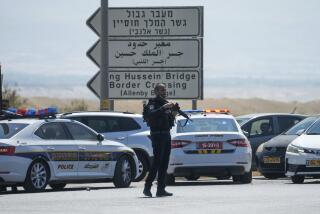African migrants en route to Israel fired on in Sinai; 15 reported dead
- Share via
Reporting from Cairo — Fifteen African migrants were shot to death Sunday in Egypt’s Sinai Peninsula while trying to reach Israel, a hospital official said.
The official in the northern Sinai city of El Arish, who spoke on condition of anonymity because he was not allowed to speak to the media, said eight other migrants were wounded, adding that all the dead and injured were believed to be Sudanese.
Citing security officials as well as hospital personnel, the Associated Press reported that the migrants were caught in the crossfire during a gun battle between Egyptian security forces and smugglers.
A representative of the Egyptian Health Ministry in northern Sinai said the slain migrants were shot at dawn south of the town of Rafah, adding that the wounded Africans were in serious condition. The Interior Ministry did not immediately issue an official statement on the clash.
Israeli media reported that a similar incident occurred early this month, when Egyptian forces opened fire on a group of 28 asylum seekers, apparently all Sudanese, who were trying to cross the border into Israel. One migrant was killed and five others were wounded before the group made its way into Israel.
In recent years the Sinai has become a favored route for African refugees seeking to migrate to Israel, often after paying human smugglers to guide their journey. Migrants crossing the desert risk not only becoming caught in clashes between their smugglers and security forces, but also are traveling through an area where the Egyptian army and police are fighting Islamic insurgents.
In addition, migrants risk abuse at the hands of both Bedouin tribes involved in the human smuggling business and police, according to a report last year by Human Rights Watch, the activist group.
Those migrants who reach Israel are far from welcome.
For nearly a decade, the Israelis have grappled with illegal migration from Africa. A barrier erected along its 150-mile border with Egypt in 2013 has largely stemmed the flow of asylum seekers smuggled through the Sinai Peninsula, but the government remains challenged by as many as 50,000 migrants already in the country.
The Israeli government regards the non-Jewish migrants as infiltrators and a social time-bomb upsetting the country’s delicate demographic balance. Very few migrants have been granted official status, though Israel follows the international practice of not returning migrants to the troubled nations of Eritrea and Sudan, from which most arriving in Israel originate.
Over the years the government has taken various measures to discourage the migrants from staying, putting up obstacles to legal employment and housing and building Holot, a holding facility for illegal migrants in a remote desert location.
The original legislation allowing the government to detain migrants in Holot for three years was overturned by the Supreme Court, which ruled it unconstitutional. Subsequent legislation was nixed twice.
In August, the Supreme Court ruled that newly arrived migrants may be jailed for three months and ordered the state to release all those held at Holot for over a year at once.
In the past, Israel has tried to encourage what the government called voluntary departures in return for a one-time grant of several thousand dollars. According to rights organizations, about 9,000 asylum seekers have left Israel in the past few years.
Israeli authorities say agreements have been reached with third countries to take in the migrants from Eritrea and Sudan but have not made public the details. Last week, a court upheld the government’s right to jail those migrants who refuse to leave.
Last month, an Eritrean asylum seeker mistaken for a gunman during a shooting attack in Beersheba died after being shot by a security guard and then lynched by an angry crowd of Israelis.
Special correspondents Hassan reported from Cairo and Sobelman from Jerusalem.
More to Read
Sign up for Essential California
The most important California stories and recommendations in your inbox every morning.
You may occasionally receive promotional content from the Los Angeles Times.













